Stories/Testimonials
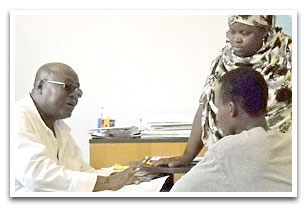 A FIRST Testimonial
A FIRST Testimonial
Just wanted to share some pictures that reconfirm the importance of FIRST even beyond the funding provided for rent, utilities, etc. -- the support you provide for Sheiknur, Khadija (two case workers for FIRST), and the office remains extremely critical to the refugee community -- for the third year in a row one of my wife's former students has collected shoes (new & used) for the community -- over 100 of the 145 pairs were distributed thanks to the coordination efforts of Sheiknur and Khadija -- not only were the shoes important, but the positive "social" time together allowed for a "good time had by all" -- in addition, you will see Sheiknur "doing his thing" of counseling clients through confusing paperwork -- thank you for this critical component of FIRST's contribution to the community.
-Larry Kendall
A Refugee's Story
I Am For Peace
Author, Caroline Rouse , 12 year old MICDS student at the time she wrote this interview. This is her story. It's not mine. I hope I get the words right.
We visited early on a snowy January morning. I slipped inside, took off my wet sneakers and shut the thin front door. The mail slot was stuffed with rags to keep the wind out. Inside the apartment, it was warm. The air smelled like garlic and simmering tomatoes.
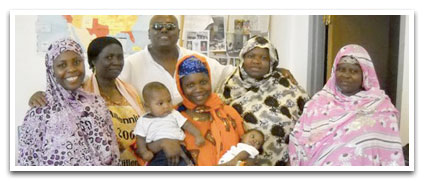 Quietly, I walked up the narrow steps. A girl sat on a mattress on the floor, calming her fat baby brothers. She was young- barely seventeen. The baby, his skin so rich and smooth, reminded me of chocolate milk. He was just a few days old, her brother. I gazed at her. She was so different from anyone I had ever seen. There she sat, wrapped in a deep indigo cloth with golden loops circling it. Her hair was pulled up in another equally as beautiful cloth of sliver and purple. She glanced up at us.
Quietly, I walked up the narrow steps. A girl sat on a mattress on the floor, calming her fat baby brothers. She was young- barely seventeen. The baby, his skin so rich and smooth, reminded me of chocolate milk. He was just a few days old, her brother. I gazed at her. She was so different from anyone I had ever seen. There she sat, wrapped in a deep indigo cloth with golden loops circling it. Her hair was pulled up in another equally as beautiful cloth of sliver and purple. She glanced up at us."Welcome," she hummed. Her voice flowed like trickling water. She nodded towards us.
She rose to leave the room. I didn't want her to.
"We- we brought some things for the baby," I stammered.
She turned. The cloth flicked around her ankles. "Yes?" she inquired. I held them out as she gestured to a space near the door.
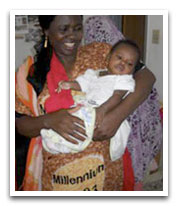 "Our teachers told us about you..." the other girl began. Yes. They had told us. They had told us about her mother. She had breast cancer, and because she was pregnant, she had to stop her treatment. Once the baby was born, she became very ill. It was dangerous for her to just move. She was in the hospital in an induced coma. "No better, no worse," her father had told us. I shivered. He had lost his job. We looked at each other. We knew that was not all.
"Our teachers told us about you..." the other girl began. Yes. They had told us. They had told us about her mother. She had breast cancer, and because she was pregnant, she had to stop her treatment. Once the baby was born, she became very ill. It was dangerous for her to just move. She was in the hospital in an induced coma. "No better, no worse," her father had told us. I shivered. He had lost his job. We looked at each other. We knew that was not all."We would like to understand..." I tried. It was not an easy subject to get into, but she was patient. I tried again, "If you could tell us about Somali..." She seated herself back next to her brother. We watched her intently. Her rich brown face was the color of the wood of the fine four-poster bed I slept in at my big house. She showed no fear, no sorrow. Awkwardly, I sat at her feet with my classmate. I felt like I was all elbows and knees. "I am from Somalia," she began. "I am Zam Zam." Her soft, chestnut-colored eyes said more. I am from starvation. I am for freedom. I am for peace.
"Where I came from, the sun was always shining. There were never cold winters," she looked like she was swimming in a dream. Her eyes misted as she began to tell how she came to be here, in this room, in America.
Suddenly, her calm face hinted a frown, "There was always sun in my country but there was always war, too. My mother tried to shield us from the stories of people who disappeared in the middle of the night, stories of people who were forced to abandon everything they knew. She did a good job until our lives became one of those stories."
"It was a peaceful night, all quiet with every star looking its brightest. My bed smelled like warm cinnamon, like my entire house," a pang of what appeared to be homesickness touched her deep eyes. "My house was large, much larger than this here," she flung her arms wide. "It had real wooden floors and beautiful rugs covering every one. They shone in brilliant colors, like they were made of the stars plucked from that sky."
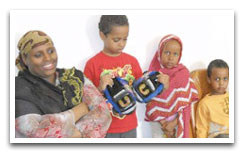 She sorrowfully shook her head, stared at the wall for a moment and then moved on, "I was a little girl, seven or eight maybe, when the rebels came for my father. He tried to get away, but they had guns. They took him away." Her voice was a whisper now. That was not all the rebels did. They hurt my mother and forced us to watch, my younger brother and I. When they left, I wiped the blood from my mother's face and legs. I was terrified..."
She sorrowfully shook her head, stared at the wall for a moment and then moved on, "I was a little girl, seven or eight maybe, when the rebels came for my father. He tried to get away, but they had guns. They took him away." Her voice was a whisper now. That was not all the rebels did. They hurt my mother and forced us to watch, my younger brother and I. When they left, I wiped the blood from my mother's face and legs. I was terrified..."Zam Zam paused for a moment. My mind reeled. Our lives couldn't be more different, I thought. When I was seven, I skipped to school in my rain boots, completely carefree.
Zam Zam continued, "For the next few weeks, life passed slowly. It was as though we were holding our breath, wanting to know what would happen next, yet praying that we would be spared from it. I do not remember exactly what happened during that long, lonely time, but I do remember that we were blessed. My father found his way back to us. He had been dropped in an alley after the rebels had taken him to a hospital and drained him of his blood to give to their own wounded soldiers. My father managed to stagger home. Once he saw us, he insisted that we all start the tremendous journey to Kenya.
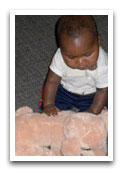 "I thought that it was the end but, in reality, that was merely the beginning of my life. Step by step, we crossed the dry, hard savannah. Spiky bushes poked up like claws from the earth. And, it was hot," Zam Zam appeared to be sweating just talking about it, "So hot," she uttered.
"I thought that it was the end but, in reality, that was merely the beginning of my life. Step by step, we crossed the dry, hard savannah. Spiky bushes poked up like claws from the earth. And, it was hot," Zam Zam appeared to be sweating just talking about it, "So hot," she uttered."So dusty and bleak, it looked like a sea that would not end." This seemed too sad, too... too tragic to be true. I couldn't believe it. "What did you have with you?" I paused, and then started up again, "Di-did you have water, o-or shoes?"
Zam Zam laughed. "At first, yes. We had water. It did not last. Some days we had barely enough. I had sandals," she hesitated, "I was lucky. Mine were thick. All leather. Others' were not so strong. Their feet became cut and infected."
She told us more. How she often passed heartbroken people struggling to survive, how when she felt finished, her father would firm her up with his saying, "I will get to Kenya if I have to crawl every single kilometer." He was so sure everything would turn out right. There was not much more that needed to be said. She had to believe in him.
"Who knows why we were chosen to make it out? Who knows how long we trekked through that forsaken savannah? Suddenly it seemed that we knew so little. I felt like I knew nothing the day we reached camp. I was so uncertain of myself that I came to doubt if I was meant to survive. At under ten, I was not sure if I was going to live."
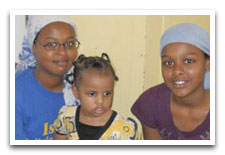 Then, she said, there was the camp. She told us it was better than the open ground. Her mother told her, "this is home now," and so it was. "From refugee camp to refugee camp, I lived in three of them, all lacking water and food. I lived on bare-bones rations. Our grand house had been traded for a mud hut with a thatch roof and one room in which my entire family of four slept.
Then, she said, there was the camp. She told us it was better than the open ground. Her mother told her, "this is home now," and so it was. "From refugee camp to refugee camp, I lived in three of them, all lacking water and food. I lived on bare-bones rations. Our grand house had been traded for a mud hut with a thatch roof and one room in which my entire family of four slept."Then," she smiled, "it became a family of five." In the middle of an overcrowded refugee camp, her mother was given an "angel". "We loved him with all our hearts. Liban. He grew big and strong, from one to two, three, four, then five. Yes, he grew up in a refugee camp. I expected to live there, too, for the rest of my life, but then my father and mother said we were moving again. "To America," they told me. I was not sure what to make of that. A whole new place where my language meant nothing? How could I go?"
"But we would have a home," my father said, so we went. There were papers, and waiting, and interviews, but then it was over. We boarded a plane and I saw Africa fade away."
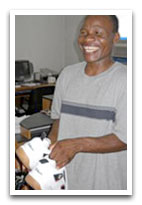 She finished. Then began part two of her life. It was supposed to be perfect in America, but she was experiencing hardship here just as she had there. I thought for a moment. Such a strong person. A refugee. Her mother in the hospital and her, left to take care of a house, a newborn baby, and all of her schoolwork? Downstairs, I could hear the door opening and the noise of more visitors.
She finished. Then began part two of her life. It was supposed to be perfect in America, but she was experiencing hardship here just as she had there. I thought for a moment. Such a strong person. A refugee. Her mother in the hospital and her, left to take care of a house, a newborn baby, and all of her schoolwork? Downstairs, I could hear the door opening and the noise of more visitors."This baby," Zam Zam stated firmly, "this baby will not know the hunger. He will not know the violence. He will not know the war." No, I thought, he won't. I watched her stare lovingly at the baby. I looked at him, too. He had so much promise, so much that he could do in this world. I glanced around. How much could he do if no one helped him? Then, I realized Zam Zam had that same promise. In a few years she would go to college. What a huge impact she could have on this world! My eyes fell to the floor. Once again, she had a barrier to break. But she had done that before by even ending up here.
Zam Zam is now in her second year of a pre-nursing curriculum at a local junior collage after having graduated from Rockwood Summit High School.